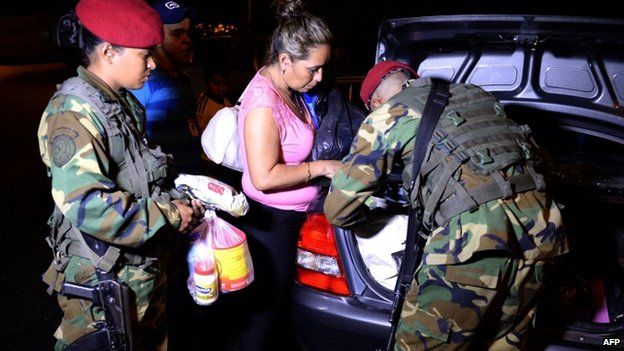Venezuela holds 13 and seizes tonnes of food in smuggling crackdown
- Published

Venezuela says it has arrested 13 people and seized 136 tonnes of food since it launched an anti-smuggling operation on its border with Colombia.
Last Monday, Venezuela deployed 17,000 troops along the border and began closing all the crossings at night.
The one-month ban will be lifted in mid-September.
Before the restrictions, up to 40% of goods Venezuela subsidises for its domestic market were being smuggled into Colombia, the authorities said.
The goods were being sold illegally in Colombia at much higher prices.
More than 20,000 litres of fuel have been seized from alleged smugglers in the past eight days, the Venezuelan authorities said.
Venezuela, a major oil producer, has the cheapest petrol prices in the world. It costs less than $1 (£0.60) to fill a medium car's tank.
It estimated, before the operation was launched, that 100,000 barrels of petrol were smuggled through its western border every day and sold illegally in Colombia.
"The amount of staples smuggled to Colombia would be enough to load the shelves of our supermarkets," Gen Efrain Velasco Lugo, a military spokesman, told El Universal newspaper.
"Those mafias are making a final, desperate attempt to get hold of them. But we are fighting them and vigorously tackling smuggling in the region."
The Venezuelan military said it has also destroyed or partially blocked 64 paths used by smugglers to cross the porous 2,200-km long (1,360-mile) border.
Dissatisfaction with the shortage of many staples, as well as rampant crime and high inflation, led thousands of people in the western Venezuelan states of Tachira and Merida to take to the streets in January.
The protests quickly spread to the rest of Venezuela, which faces similar problems.
The opposition blames what it says are the failed left-wing policies of the past 15 years - initiated by late President Hugo Chavez - for the country's economic crisis.
Correction 11 September 2014: This report, originally published on 19 August, contained a reference to the border closure being agreed by the two countries, based on statements by Venezuelan officials. This has been removed as Colombia later called it a "unilateral decision".
- Published12 August 2014
- Published10 August 2014
- Published31 March 2014
- Published7 March 2014